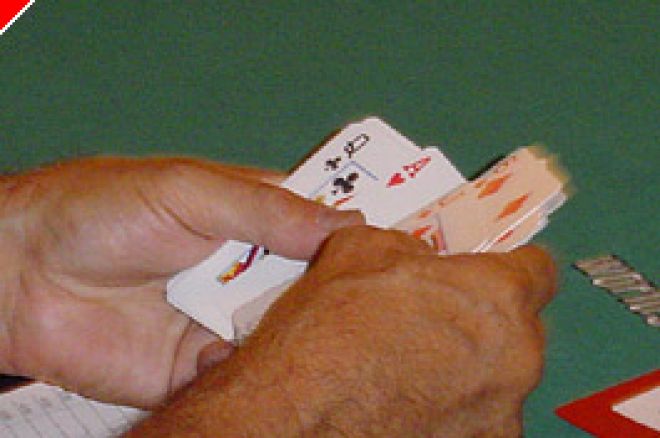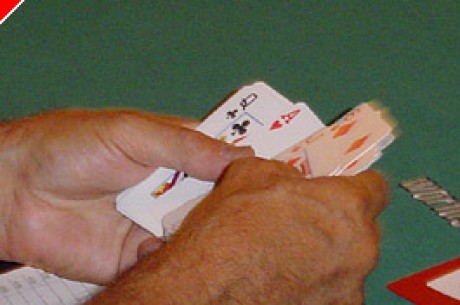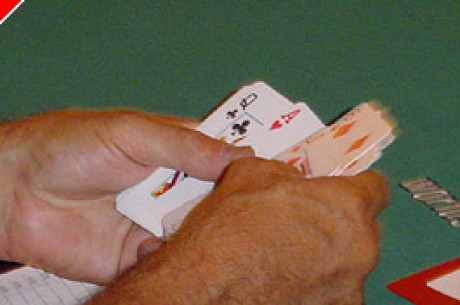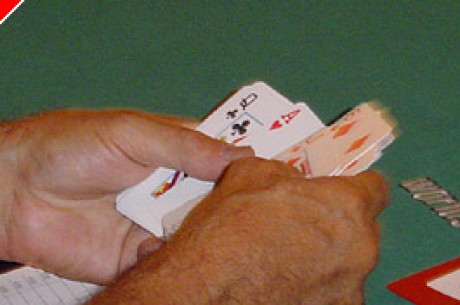Stud Poker Strategy - Folding on Sixth Street

There is a commonly spoken poker adage that a good stud player doesn't fold on sixth street. He bets, raises, or he calls. I've heard this from many seasoned players – including a couple of pros.
The adage is wrong, of course.
There is no 'always' in poker (except maybe that there is no 'always' in poker). Everything has an exception. Smart players can find exceptions to every general rule of play. It's what makes our game so interesting – and so frustrating. For every general rule of thumb, there's some good reason for not following it. That can get many players into trouble – as they justify their mistaken deviance from the established and proper path with whatever rationalization they impulsively think of. "I'm varying my play" is a common one. So too is "I don't want to be too predictable".
So, back to my initial point. While it is generally correct that most of the time it doesn't make sense to fold on sixth street because of the large pot size relative to the bet size – there are many, many exceptions to this general rule. Let me focus on just one of them – when you believe you are drawing dead.
Drawing dead refers to those situations when you cannot draw a better hand than your opponent currently has. So, for example, if you have a 4-flush on sixth street and are hoping to draw the fifth suited card to make your hand, but your opponent is already sitting on a full house – you are drawing dead.
If you have good reason to believe that you are drawing dead, you want to fold to a bet on sixth street. Obviously, the bigger the pot at the time the more certain you need to be that you are drawing dead.
Here's an example of when you can be certain enough that you're drawing dead and so should fold on sixth street.
You have:
(Ks9s)Qs2sJc3h
You opponents have:
BUDDY: (xx)Ad6d5hKd
ZAB: (xx) 9hAs9d6d
Neither of your opponents are maniacs. Each is a good, though not great, straight forward, tight/aggressive stud player.
Zab has first action. He's been betting since he paired his 9s on board. He opens by betting $40 in this $20/40 stud game. Buddy raises him to $80. What do you do?
If they were maniacs you might call. But they're not. They're rational players. You have to give their betting action some meaning. What does Zab's bet mean? What does Buddy's bet mean?
Zab is betting that Buddy doesn't yet have the flush. But Buddy's raise means that he does have it. Why else raise. If he were drawing to a flush he would want to see the river as cheaply as possible.
It's up to you. Maybe it makes sense to draw another card yourself? Maybe you'll hit your flush and win this enormous three-way hand.
Wrong thinking. Look more closely. How high is your flush going to be? The best you can do is hit a King high flush – because the Ace of your suit is out. If Buddy has his flush it will beat yours – even if you hit one! That's the key. You're probably drawing dead. You should fold.
In fact, with the third player Zab initiating the betting with his paired door card you've got to put him on at least three 9s. But he could already be filled up. What will you do, for example, if you call Buddy's raise only to see Zab re-raise the hand? You'd probably have to fold – because once again you have to credit them with rational moves that indicate hands that are better than the one you can draw to.
Even with a very large pot, you don't want to automatically call on sixth street. If you're drawing dead then no matter how big the pot may be and how large the pot odds you're getting are, you're still wasting your money.
Ed note: Stop wasting your money elsewhere, and sign up at Absolute Poker today.








